While COVID-19 continues to cause devastation and disruption around the globe, a new book brings nine writers together to explore and reflect on the pandemic and how Christians may address the tragedy with spiritual advice, prayers and questions suitable for group discussions. University of Queensland Senior Research Fellow Dr Paul Tyson reviews.
This book of Christian responses to our COVID-19 context is strangely unified even though it is comprised of 11 chapters by nine very different people.
It is worth briefly listing how different the professional backgrounds of these writers are. Irene Alexander lectures in psychology and spirituality. Paul Mercer is a medical doctor. Ross McKenzie is a physics professor. Chris Brown writes out of his long career lecturing in counselling and social policy. Athena Gorospe lectures in biblical studies in Manila. Terry Gatfield lectured for many years in business. Tim McCowan is an ordained minister and lectures in spirituality. Sarah Nicholl was a solicitor and remains a scholar of spirituality. Charles Ringma is a Companion of Northumbria Community and is a well-known theologian and devotional writer.
What unifies these very different voices is the long developed bond of friendship between each contributor, genuine spiritual depth, and a very hands on commitment to serving the Lord through serving others. Reminiscent of an old married couple, these friends think and act very differently but understand each other as with one mind.
With my academic hat on I have to confess that this book is not easy to review. Because the contributions are so varied and come from such a range of practical and professional experiences it is not possible to review this volume by producing a potted conceptual summary and then seeking to outline the argument’s strengths and weaknesses. Indeed, this book is not an argument but an aid to prayer and action-concerned contemplation. It is something of a breviary where its strengthening and challenging chapters are interspersed with scripture readings and liturgical refrains. Taking my academic hat off, I can see that it is a very fine aid to prayer, and to thinking about and responding to our COVID-19 times.
In this book, richly different voices unpack the practical, human, political and theological complexities of being Christians in this time of crisis. A triumphalist overcoming of every enemy to health and physical wellness is firmly rejected and the deep reservoirs of a Christ-like embracing of human frailty is powerfully drawn on in different registers.
The book advocates no passive surrender to what Saint Paul might call the natural man’s response to pandemics (perhaps summed up in the refrain “stay safe”), but it is an eyes-wide-open call to risk embracing a Christ-like humanity in the context of the brazen de-humanising energies that a pandemic releases from within us.
Athena’s observations as to how the Philippines government has enhanced its totalitarian reach over the lives of citizens in this time is particularly poignant in reminding us that it is the most vulnerable who are the hardest hit in any human disaster. In less overt ways, this is true in places like Australia as well.
The challenge to uphold just care and compassion for the vulnerable at such a time of extraordinary state powers requires a unique combination of good medical sense and sharp political savvy from Christians. All contributors understand this dynamic very well. They also understand that the Christian life is a call to service and suffering, and that the deep fountains of Christian spirituality understand this very well. We are encouraged to drink from that fountain in this book, and whilst such cool and living waters are nothing like the warm milk of consumer comfort we are all rather accustomed to, they are truly refreshing waters, as they speak to the reality of human experience. If our Christian spirituality cannot address the realities of human suffering, if faith is only a gloss on being healthy, wealthy and happy, then it has no real continuity with the much-needed true resources of Christian spirituality.
This book is a bracing and refreshing read, and a well-placed and clear call to the compassionate and intelligent practice of Christian spirituality in our COVID-19 times.
Dr Paul Tyson
Dr Paul Tyson is a Senior Research Fellow at the University of Queensland’s Institute of Advanced Studies in the Humanities.
To Whom Shall We Go: Faith Responses in a Time of Crisis
Editors: Irene Alexander, Chris Brown
Publisher: Cascade Books
2021
To purchase visit Wipf and Stock
 JourneyOnline
JourneyOnline







